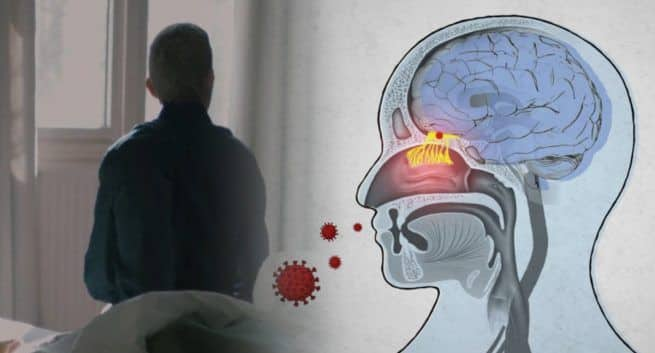
5 Symptoms To Look Out For: Coronavirus infection affects the lungs and the respiratory system, causing severe damage and fatal health complications to the organ. But did you know your brain is too at risk? Yes, according to the leading neurologists, about 20-30 per cent of Covid patients in intensive care unit have some form of brain involvement. Experts revealed that, apart from four broad categories of brain involvement in Covid, the secondary infections coming with Covid are also causing direct brain involvement.
Speaking to the media, Continental Hospitals’ senior consultant neurologist M. K. Singh said, “Apart from four broad groups of brain involvement, we also get neuropathies something like Guillain-Barre Syndrome when a person becomes paralysed. This is also being increasingly seen in patients with Covid”.
How COVID-19 Affects the Brain
Brain manifestations of Covid can be broadly categorised into four groups. There is the vascular category where there is clotting in arterial system or the venous system thereby leading to infarct in the brain or venous haemorrhage in the brain.
The second category is direct infection of Covid virus to brain which usually manifest in “brain fog” or encephalopathy in which patient becomes too sleepy and is not arousable. According to the experts, this persists even after Covid is gone and persist from few weeks to sometime months.
The third aspect of brain involvement in Covid is because of hyper-inflammatory response. “In these cases, we get lot of acute demyelinating encephalomyelitis. The brain white matter and gray matter swells and it causes very severe damage to the brain. It can affect one part of the brain or can affect all over the brain,” M. K. Singh was quoted as saying.
Neurologic Manifestations Occur In 50% of Hospitalised Patients
Secondary infections which are coming with Covid are also causing direct brain involvement. The mucus spreads from nose to the brain or from the ear to the brain and sometimes through the blood vessels, to reach the brain and cause a lot of brain damage. Other secondary infections of brain are also increasingly in view of Covid caused immuno suppression as well as medication induced immuno suppression. According to the experts, neurologic manifestations occur in approximately half of hospitalised Covid patients.
COVID-19 And The Brain: Top 5 Symptoms To Look Out For
When coronavirus enters the body, it not only affects the lungs but also there organs such as the brain. Some of the common neurologic symptoms that you may experience after your brain gets infected by coronavirus are:
- Myalgias
- Unexplained headache
- Encephalopathy
- Extreme dizziness
- Dysgeusia (altered taste), or anosmia (loss of smell)
Apart from the above listed symptoms, stroke, movement disorders, motor and sensory deficits, ataxia, and seizures can also occur.
COVID-19 And Stroke In Patients
Stroke has been associated with Covid-19 in approximately 1 to 3 percent of hospitalised patients, with higher rates in those with more severe Covid. “Several stroke subtypes may occur, including ischemic stroke, intracranial haemorrhage, and cerebral venous sinus thrombosis. The risk of stroke may vary according to the severity of Covid-19. In patients with mild illness, the risk is less than 1 percent, while for patients in intensive care, the risk may be as high as 6 percent,” said Changala. Stroke associated with Covid-19 may be more severe than stroke without Covid-19. Most often, stroke occurs one to three weeks after onset of Covid-19 symptoms.
Autoimmune Meningoencephalitis In Coronavirus Patients
Both viral and apparent autoimmune meningoencephalitis can be seen in patients with Covid-19. Acute disseminated encephalomyelitis (ADEM) and acute haemorrhagic necrotising encephalopathy case reports have been seen. The symptoms include:
- Altered consciousness
- Seizures
- Weakness of one side of body with difficult in speech or weakness of all four limbs depending upon the region of brain involved.
- Abnormal movement of limbs
- Imbalance while walking
- Swallowing difficulties etc.,
According to SLG Hospitals consultant neurologist Dr Suma Kandukuri, severe Covid-19 has a variety of neurological manifestations including altered mental status and other acute cerebrovascular diseases. “Most common cause of altered mental status is due to deranged metabolic profile in severe Covid-19 infection. This non-specific confusional state has increasingly been described in hospitalized patients with Covid, usually seen in older patients,” she said.
These patients share common risk factors for hospital acquired delirium and there are likely unrecognised in the setting of critical illness. “In rare cases, patients have been diagnosed having encephalitis, that is direct invasion of grey matter of the brain by the virus but extent and frequency of direct viral involvement of the nervous system will have wide-ranging implications on treatment approaches as well as prediction of long-lasting effects of illness. The proportion of patients with neurological manifestations is small compared with other respiratory diseases,” she added.
This post first appeared on The Health Site







